Articles
Kelsey Piper: Future Perfect — a year of coverage
Kelsey Piper: Future Perfect — a year of coverage
In 2018, Vox launched Future Perfect, with the goal of covering the most critical issues of the day through the lens of effective altruism. In this talk, Kelsey Piper discusses how the project worked out, her experience as a Vox staff writer, and her thoughts on the key challenges of EA-focused journalism.
Below is a transcript of Kelsey’s talk, which we’ve lightly edited for clarity. You can also watch it on YouTube and discuss it on the EA Forum.
The Talk
It was at an effective altruism global conference — the one in San Francisco 15 months ago [EA Global: San Francisco 2018] — that I first heard rumors about what became Future Perfect. Dylan Matthews was there from Vox, and he'd written some articles about effective altruism, some favorable and some kind of uncertain, and he was telling people that Vox had just received a grant from the Rockefeller Foundation to do something a little bit different in journalism: step back from the news cycle and look at the world through a different lens.
When they heard about that opportunity, Dylan Matthews and his boss, Ezra Klein, who founded Vox, jumped on it. They're both effective altruists and had been interested for a long time in the question: “What if the news wrote about issues that are really important?”
Dylan describes this as an argument they occasionally had back when they were both at the Washington Post and covering procedural minutiae in the Senate. Dylan would say, “Is this really important?” And Ezra would say, “If we were covering what's really important, we'd never write about anything but malaria.”
I don't think that's quite true, but Future Perfect was certainly an attempt to strike out further on the malaria side of the spectrum compared to everything else that exists in the [daily news].
I'm going to go through a few things in this talk. First, [I’ll cover] what Future Perfect is, what we write about and how [we write about it], what reactions we've gotten, and what we've seen so far.
The second half of the talk will focus a little bit more on takeaways that I think are of particular interest to effective altruists. How much good have we done? How do we know how much good we've done and what are some questions in that area? If you want to become a journalist, how do you think you can do good? If you want to make more things like Future Perfect happen, how would you go about doing that?
And then hopefully, we'll have a little bit of time for questions.
What is Future Perfect?

Future Perfect is journalism from an effective-altruist lens. This is a little different than being, say, an effective altruist trade publication or an explicitly effective altruist project that tries to fuse news stories with the impact we think reporting that story will have on the world (although that is one of the many things that we think about).
You can think about [Future Perfect by using the analogy of] sports journalism, which starts with the premise that their audience cares about sports and wants to learn what's going on in the world of sports. [Similarly,] business journalism starts with the premise that the audience cares about business. Future Perfect is an attempt at journalism that starts with the assumption that the audience cares about the most important questions in the world, and that our job is to give some answers, raise some questions, and advance that conversation.
What have we covered?
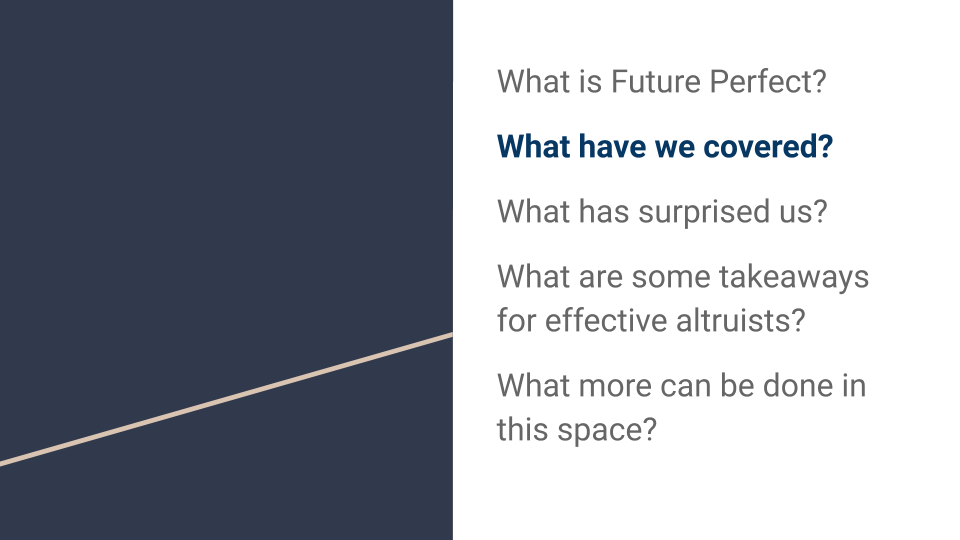
We've covered global health and development — both new studies and analyses of old studies to present our understanding of the consensus in that area. We've written about microfinance and the reasons to think it works, [albeit] not as well as everybody thought it might when they started working on it. We've written about cash transfers. We've written about new studies looking at spillover effects from GiveDirectly's work. We've looked at graduation programs which have been benchmarked against cash and found to be a promising way to help the ultra-poor.
We've written about animal welfare; we've done coverage of problems in factory farms. You might think there are so many problems in factory farms that [it’s overwhelming to choose what to cover], but often there is a particular exposé or rule change that we highlight. We've covered the rise of plant-based meat alternatives, which is something that a lot of effective altruists are excited about as a way of providing people with things they like to eat without the problems associated with factory farming.
We've covered existential risks, both with some big articles that explain the broad case for caring, say, about AI or about biosecurity, and with some more news-oriented articles that just cover advances in AI as a field, and how someone might think about them if their concern is for the [long-term] future.
We have a podcast, which has completed two seasons so far. Season One highlights a lot of interesting, weird ideas for making the world better, pulling in some things that I think are rarely discussed even in EA circles. It's a great introduction to many different ways of answering the question “How do we do a lot of good?” Season Two is a little bit different. It looks at philanthropy and the ways in which people who donate money have been able to shape the values of the movements they donate to, for good and sometimes for ill — how donors have been able to raise an issue and bring it into the mainstream when it was previously not taken very seriously. I don't know what Season Three will be about, but we want to continue answering questions that are interesting to effective altruists.
The newsletter comes out twice a week. The three authors of Future Perfect write introductions to it. Sometimes those are things that interest us. Sometimes they're more link-roundup focused, but are sort of a window into what we're thinking about when we pick articles for Future Perfect. We write about three to four articles a week, and on a busy week, sometimes five.
The pace is actually one of the things that really took me aback when I started writing for Vox. About a week before I started, somebody pointed out to me on Vox's website that a particular author had written six articles [in the past week], and they were like, “Kelsey, are you going to have to write six articles?” And I said, “Wow, I hope not. I can't write six articles. They probably would have told me if they expect me to write six articles.” We spent an hour or so going through all of Vox's writers and checking how many articles they'd written in the last week, and I was relieved that most of them [had written] a manageable three or four. Future Perfect has a slightly slower pace than the rest of Vox because we have a broader area to cover and need to know a lot about more distinct topics.
But we still write a lot of content. I think that's been really good for me as a writer, to delve into so many different things and to be required to turn out articles about so many things. It stops me from putting article after article in my Drafts [folder] and waiting until I feel like [they’re] perfect, which means they never come out of my Drafts [folder]. And it means that there is a lot of Future Perfect content out there.
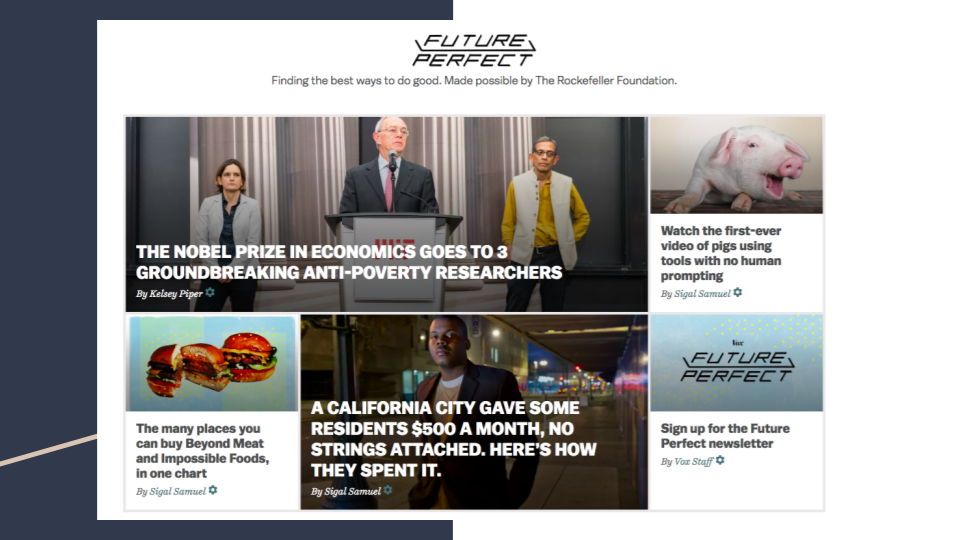
I have some of the articles that we've [done]. This [reflects] just a random day — the day my slides were due [for this talk and what was on] the front cover of Future Perfect. It shows some of the variety of content that we cover, from the Nobel Prize in Economics to some stuff about how pigs are smart. There’s a UBI [universal basic income] experiment, a map that helps you figure out where you can find plant-based meat, and much more.
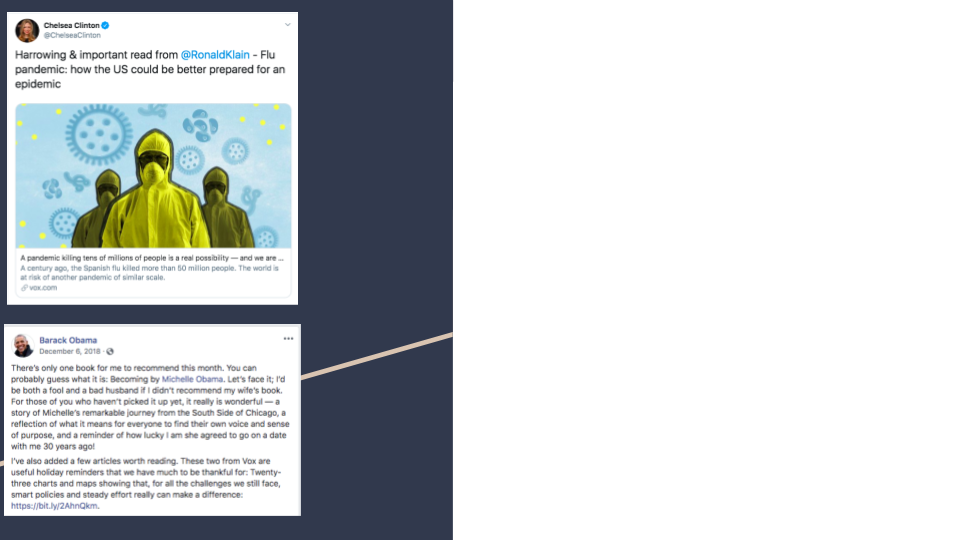
We've received some really positive reactions to Future Perfect’s coverage, including from some important people. One of the great things about Vox as a venue for Future Perfect is that Vox is taken pretty seriously by policymakers. Barack Obama has recommended some of our articles. Senators often share articles that we write about their policies, and about policy issues that they find pressing. So it's a great way to get EA ideas into the national conversation, and [to get] a lot of people reading and talking about them who otherwise probably wouldn't.
What has surprised us?
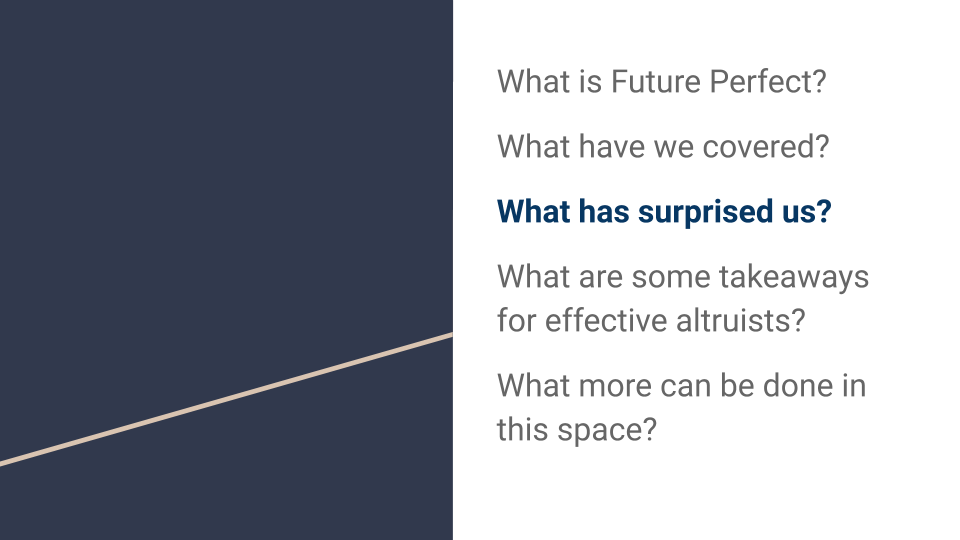
The next question is: Looking back after a year, what has surprised us? I'd say a few things. One of them is the reach that Future Perfect has had. Millions of people read our more popular articles. Recently, an article I wrote about the backlash against plant-based meat reached 2.5 million viewers in a few days. That left me thinking, “Wow, that's so many people.”
There is a lot of interest in these issues, and there's a lot of appetite for coverage. In some ways that’s really exciting because it means that there is space for more things like Future Perfect and space for Future Perfect to grow. Also, it means that there are a lot of people who want to read about these topics of interest to EAs. And so while EAs are a huge part of our audience and we take the perspectives of the EA community on what we're doing really seriously, we're also reaching way beyond the EA community. That's both really powerful and, honestly, a little bit scary, because it means that a lot of people's only knowledge of EA perspectives and topics might be coming from Vox's Future Perfect. So you might be thinking, “Are you careful enough about what you're conveying to everybody about EA?”
And actually, one of the reasons Future Perfect is called Future Perfect is that we didn't want to call it “Effective Altruism Vox” or anything like that. I think the EA community didn't want that, because then Future Perfect would represent the EA community even more strongly to people who wouldn't have [otherwise interacted] with it. And Vox didn't want to do that, because while it's an EA lens we're using to look at the world, it's a journalistic project that’s not explicitly designed [to feature] articles that will do the most good.
That degree of separation allows us to have the editorial independence that's important for journalists, and allows [the effective altruism community] some assurance that even if we get things wrong, nobody's going to come away with the impression that that's what effective altruism is all about. That said, I think a lot of people do associate Future Perfect with effective altruism, so this problem is still there, and it’s not a soft one.
A particular detail that surprised me is the enthusiasm for articles about the scientific process and the [research] replication crisis. I write about [many topics], and have gotten a sense for which ones get a lot of page views. Global health and development articles tend not to, although they're really important. I'm really glad they're part of what we write, but they don't tend to have much reach beyond the 10,000 or so reliable people who will read almost everything we write. If you're one of those 10,000 people, you're great. You're 10,000 of my favorite people in the world. But you know, the people who aren't my mom and don't read everything I write tend to be less likely to read the global development articles and more likely to read about plant-based meat. AI does pretty well. And there's a ton of interest in the process of science.
This was surprising to me because the whole narrative I'd heard about the replication crisis was that everybody wants to read about a flashy new study claiming that men like women who wear high heels (that’s one article that was retracted this week), but not that many people want to read a boring article saying that actually, that was a statistical mistake. But as far as I can tell, this narrative isn't true. People love reading the “actually, that was a statistical mistake” article. I think it makes them feel kind of smug. Even scientists who peer-review their articles and put them in journals are just wrong half the time.
There are some great people covering the replication crisis at a lot of different outlets. I think there's a huge appetite for more, and I'm hopeful that, as a result, we'll see more retractions getting as much or more air time as the original study did. So that's one really cool thing that's come out of Future Perfect that I hope spreads across the media industry.
What are some takeaways for effective altruists?
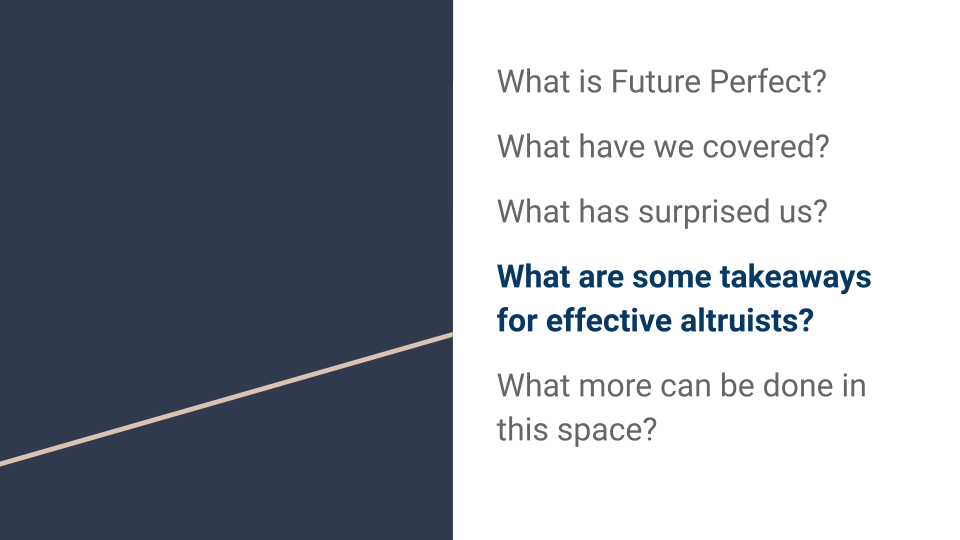
Now I want to move on to the second half of this talk: takeaways for effective altruists from Future Perfect. And I want to start by talking a little bit more about the relationship between Future Perfect and EA. I'm an effective altruist, Dylan's an effective altruist, Ezra's an effective altruist. We're doing this because we think it has potential to do a lot of good. But we don't want Vox to just be serving as an outlet for existing EA organizations or for the EA community. We'll direct people to GiveWell for as long as we think that GiveWell is the best place to direct them. If it turned out that GiveWell was fraudulently buying yachts or something, then we would cover all of the signs of that in detail.
So a little bit of independence lets us do journalism and hopefully be a voice for accountability, if that's ever needed with the EA community. And as a result, Future Perfect is not an EA project.
But I think a lot of EAs are still really interested in questions like “Is Future Perfect doing good?”, “Should we give it money?”, “Should there be more things like Future Perfect?”, and “Should I be a journalist and do something like Future Perfect?” So I'm going to talk about all of those questions. However, Vox isn't necessarily using those questions to make decisions about what Future Perfect is doing. It's one of many considerations at Vox, with the priority being doing good journalism.
So is Future Perfect doing any good? The easiest way to measure this is to call up our friends at GiveWell and ask, “Of the people who donate to GiveWell charities and provide a reason [for their donation], how many of them cite Vox and Vox's coverage?” And the answer is quite a few of them. Something like $250,000 was moved [because of Vox] last year. And since not everybody who donates to GiveWell [does so directly] through their site — i.e., some people donate directly to GiveWell’s recommended charities — and since not everybody who donates through their site fills out the box [asking why they’re donating], that figure is probably a substantial underestimate of how much money people move to GiveWell’s top charities because of the work done by Vox's Future Perfect.
I was super excited when I heard this. It made me really, really happy. It's a lot more money than I'm ever going to be able to donate, so it's super cool to know that Vox might be affecting [donations]. That amount is from 2018, and Future Perfect launched in October 2018. Most donations come in November and December. That's when people make their donation decisions. So I think this is somewhat attributable to Future Perfect. But it's clearly not purely attributable to Future Perfect. The 2019 numbers, when they come in, will be a little bit more decisive.
On its own, that's the starting point for the case that we're doing something worthwhile, and I think it suggests that [launching] something like Future Perfect at an outlet that doesn't have a lot of readership overlap with Vox could be really valuable. You could reach those audiences and tell them about giving opportunities.
From here, we're venturing into more speculative territory. There are some stories about how Future Perfect might be doing good, which I'm very unsure of. I think these might be happening. I don't know how much of an effect they have, and it could turn out five years from now that I am [giving a talk like this] and saying, “Actually, this one didn't pan out at all and we don't think Future Perfect had any impact [in that regard].” I'm sure that will be true of at least some of these.
One example is that maybe it's good for the broader American public to be exposed to the concept of thinking about the world in the way that effective altruists do — that is, in a consequence-focused way. [For instance, maybe it’s good to inspire people to talk about] charitable interventions [in terms of] how well they work and how strong the evidence base for them is, or in a long-termist way that considers big, long-term problems and assumes that we care about the far future and future generations, and even that we're very sure extinction is bad and we should probably try to avoid it. Because there's a lot of discussion that just doesn't really take a strong stance on questions like those. So maybe there are some benefits to making a broad population of millions of people think about those ideas a little bit. Maybe people will be a little bit more likely to go look other things up.
And then there’s a separate argument that I think is [nonetheless] related: Maybe, of those millions of people, some [will find] Future Perfect to be the connection that they needed to [take EA actions] like buying Toby Ord’s book [The Precipice] or Stuart Russell's new book (which we're going to have an article up about next week), or going to the EA Forum or an EA site like 80,000 Hours, or getting much more [involved] in the community. And maybe five years from now we'll be able to say, “Hey, are there some people [at this conference] because of Future Perfect?" And if there are, that would be a really great case that Future Perfect [is doing good].
And again, that would imply that we should have [journalism like] Future Perfect in areas with different audiences than Vox’s, in areas where we don't have something like Vox to reach the people who will be excited about effective altruism once they've heard about it.
Another story is that in a few areas, publicity is what matters, and Future Perfect can provide it. Plant-based meat is sort of the strongest case for this. There has been a big upsurge in interest in plant-based meat alternatives over the last year. Beyond Meat went public. Impossible Foods raised a lot of money. Both of them expanded to grocery stores and restaurants across the U.S. and the U.K. Apparently, here in the U.K. people are getting the Impossible Whopper by the end of the year. It made a huge splash in the U.S., so I'm sort of hoping for the same reaction everywhere else, because that really drives further adoption by competitors and other companies.
All of that leads to more people having heard of plant-based meat products, and therefore asking about them at restaurants. That leads to more restaurants including them. So publicity is part of a virtuous cycle that perhaps will result in a substantial portion of meat consumption being replaced by plant-based meat. Future Perfect has covered this because it's newsworthy. It has involved a lot of big companies and big product decisions, and by covering it maybe we've contributed to that publicity, and done some good that way.
Maybe there's a similar thing happening in other areas. Maybe charities benefit a lot from coverage that directs people to their site to learn about what they're doing. Maybe there's a way to affect issues like AI with coverage that brings more attention to these issues and then creates publicity around change.
[It’s also possible that] publicity is bad in a lot of EA areas. I've heard this concern voiced most when it comes to AI and biosecurity. With biosecurity, the concern is pretty straightforward: Maybe it's a bad idea to signal-boost a powerful way to hurt people. With AI, the argument is usually a bit more complicated. There's a simplistic narrative about AI, which is that tech companies are probably going to do something stupid, and we should regulate them before they do. And then there's a much more complex narrative about AI, which is that any group developing it — whether they are a tech company, a government, or a nonprofit — is going to run into some very hard-to-solve technical problems, which will probably produce bad results even if we have regulations in place that seemed to us to be very conservative.
The worry is that if we accidentally push a lot of people to believe the first [narrative], and then it turns out that we needed them to believe the second [narrative], maybe we end up [having been] obstructive, burning public approval, and causing problems. So publicity can be a very powerful tool for good, and also a very powerful tool for causing problems. I hope we're doing more good than causing problems, but this is actually [a topic about which] I want to be in tune with the opinions of the EA community. If you read an article and you're like, “This feels like more of a problem article than a good article,” I really value getting emails about that. It’s helpful to hear perspectives on where to put more emphasis, energy, and attention, and where that could be counterproductive.
What more can be done in this space?
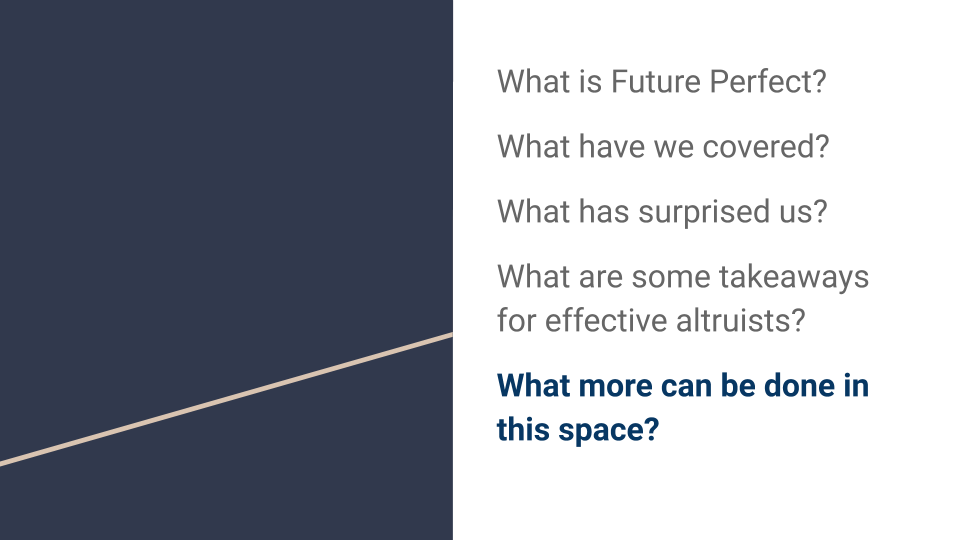
So throughout this [presentation], I've kind of been touching on this last question: What more can be done in this space?
That's a question I've been asked several times [at EA Global]. Would it be good if Future Perfect was twice as big? I think it would. We don't yet cover all of the stories that are in our purview, and that are interesting and relevant to us. That's partly because we only have three writers and we would benefit from having more people who could cover those areas in more depth. I think we could also take more chances on slightly weirder stories, or stories that take longer to report, or require more on-the-ground reporting, if we had more people. So we'll take your money [to help Future Perfect grow].
I have talked a little bit about how, in addition to that, I think [ventures] like Future Perfect in other organizations could do a lot of good, especially to the extent that those organizations don't have a lot of overlap with Vox.
Vox was founded by Ezra Klein and Matt Yglesias, two pretty well-known liberal pundits, and as a result — while it's not officially ideological — it's associated with liberal U.S. politics. I think it would be pretty cool to have something like Future Perfect in lots of organizations with different ideological bents and audiences, because that reaches a wider range of people and perspectives. Also, I think it would be cool to have something like it outside the United States.
Another question I get asked sometimes is “What if we had something that was like Future Perfect, but not part of Vox — just an independent news organization that wrote from an EA perspective and was EA from top to bottom?” I think this would let you do some cool stuff. You could have in-depth coverage of things like who was appointed to chair EA organizations, and stories about the features of EA organizations and those that want to be considered EA organizations. You could get into a lot of detail that you can't at Vox because Vox's philosophy is that every article should be accessible to a smart reader with no prior background. And there might be a lot of space for articles that require some background in EA, and that can, as a result, go into much more depth with a topic than we can.
On the other hand, there are some huge advantages to being associated with a major national publication that's also known for its Trump coverage, impeachment coverage, Game of Thrones coverage — and that has pre-existing expertise in how to do journalism and reach a lot of people. So while I'd be interested in somebody setting up something like that, I think it requires a ton of expertise to do right, and to write things that people want to read.
I feel really lucky that Future Perfect found itself at Vox, where a lot of that expertise was pre-existing.
So that's an overview of what I do. I want to leave the rest of the time for questions. Thank you all so much.
Nathan Labenz [Moderator]: I wanted to start by talking about [Future Perfect’s] funding and business model. I assume that the normal ad revenue that Vox makes applies to Future Perfect content as well, or is that not the case?
Kelsey: Future Perfect was funded for its first year by a grant from the Rockefeller Foundation. That paid for hiring a few new writers, moving Dylan to writing about Future Perfect full-time instead of the politics beat that he was on before, hiring a social media manager, and hiring an editor. And the Rockefeller Foundation is not renewing this grant for the next year. They weren't super unhappy with us or anything, but [funding us] was a stretch outside of what they normally do.
We're working instead with some other funders. I am not able to share very many details, but this will all be announced publicly pretty soon. Those funders will enable Future Perfect to continue going in basically the same vein for the next year.
We're open to sources of funding both from people who care about Future Perfect from an EA perspective and those who don’t; the Rockefeller Foundation wasn't particularly EA-oriented. There are advantages and disadvantages to both models. We probably would not take funding from the Centre for Effective Altruism or from the Open Philanthropy Project directly, because that would interfere with readers, and possibly us, feeling like we were free to say whatever we thought.
Nathan: So is there revenue, though, that comes in? I mean, the general Vox business model is ad-supported, right?
Kelsey: Yes. And Vox does make money off the ads from Future Perfect. But that's sort of separated from what we do. Future Perfect doesn't rely on getting a certain number of page views to keep existing. And when we do get lots of page views, that's just a bonus for Vox's main business, I guess.
Nathan: Got it. So from a business perspective, you're totally isolated from the ad-supported business model.
Kelsey: Yes. And that's been meaningful because there are paid view targets for a lot of departments at Vox, and we have a lot less pressure to write whatever will get the most page views — although you still want people to read your stuff. And so page views are still pretty important.
Nathan: Yeah, of course. Do you have any sense for whether, if you were not insulated from that pressure, the traffic that you're getting would be enough to support the operation as it exists today?
Kelsey: I think if there hadn't been grants, there were definitely plans to keep the writing team from Future Perfect. We would probably shift in a direction that had fewer stories that don't perform as well. [We would focus] more of our content on AI and plant-based meat — the topics that have been really promising. But certainly we write a lot of stuff that does very well by Vox's standards, too.
Nathan: Cool. On that note, how do you think about finding, selecting, and developing stories? One that stood out to me from the podcast series was about the more humane, and ultimately better for food production, method of killing fish. Where do you find this stuff?
Kelsey: There’s a lot of flexibility. If you have something that you think is sort of related to EA that I should write about, you can just email me.
I do find a lot just by reading the EA Forum and a lot of journals, and by talking to a lot of people and then picking things that are interesting or that exemplify a concept that we could be thinking about.
With the more humane method of fish slaughter, I wouldn't say that's very important in itself, but it gets people thinking about the question “Do fish suffer?” Given that fish suffer, do we have obligations to change how we process fish? Are there ways to dramatically reduce fish suffering, and what would they be? Those are questions that we want people thinking about if they've never considered them before.
Nathan: There are a few practical questions coming in from the audience. One is about writing in languages besides English. Is that an area that Future Perfect has interest in?
Kelsey: I think it would be super cool if that existed. Vox doesn't have the expertise to do it in-house, but I would be really excited about people starting things like Future Perfect in other languages. It seems like you could bring similar concepts to other audiences that way.
Nathan: And here’s another audience question about different forms of media. You obviously have columns in the blog format as well as the podcast. Have you given any thought to expanding into other forms, or do you have other types of media that you think could be fruitful for people to consider?
Kelsey: Vox has a big video team and produces a lot of content for YouTube, and I hear that lots of people mostly interact with the news, ideas, and speakers through YouTube. So I would be pretty excited if somebody was like, “I want to start doing something like a YouTube for effective altruism.” It would be exciting if Vox got the funding to do that, and it would be exciting if somebody [at this conference] is like, “Yeah, I feel like I could stream and talk about effective altruism.” I don't think I could personally do that — it sounds terrifying — but it would be cool.
Nathan: Well, don't sell yourself short. I think you've done an amazing job here in front of this audience, so I'd love to see you maybe give the YouTube thing a shot one day. How about a round of applause for Kelsey Piper?